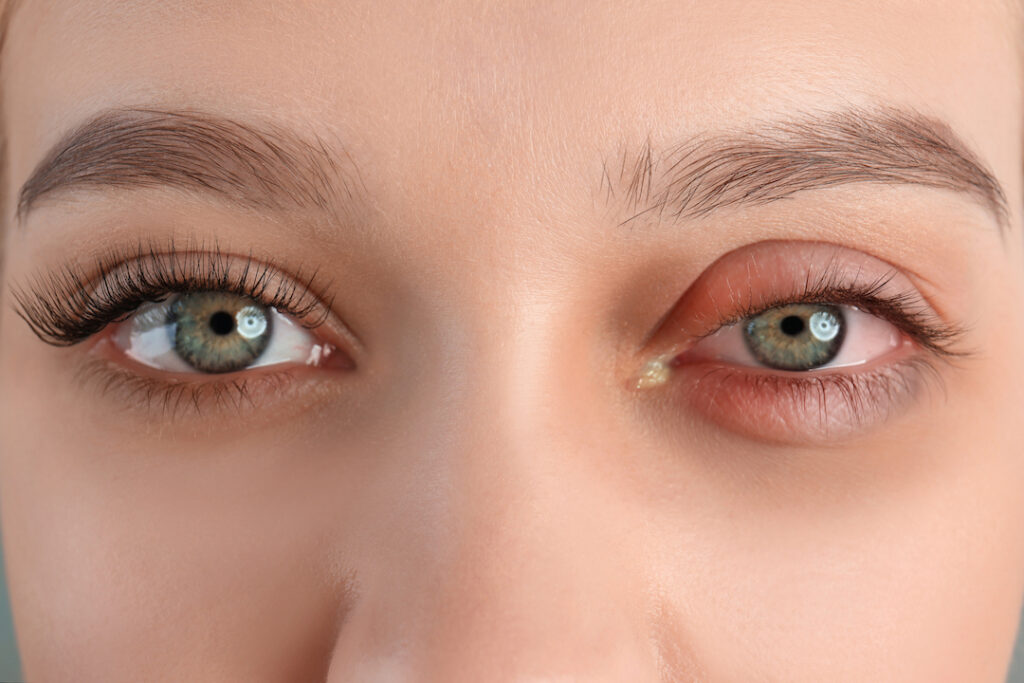Allergy Relief in Sight: Immunotherapy for Allergic Conjunctivitis
(Posted on Wednesday, December 6, 2023)

Woman with inflamed eye suffering from conjunctivitis, closeup
This article was published on Forbes on 11/28/2023.
This story is part of a series on the current progression in Regenerative Medicine. This piece is part of a series dedicated to the eye and improvements in restoring vision.
In 1999, I defined regenerative medicine as the collection of interventions that restore to normal function tissues and organs that have been damaged by disease, injured by trauma, or worn by time. I include a full spectrum of chemical, gene, and protein-based medicines, cell-based therapies, and biomechanical interventions that achieve that goal.
Allergic conjunctivitis is a common and debilitating condition affecting millions globally. It is characterized by a chronic inflammation of the eyes, which is triggered by exposure to allergens such as pollen, dust, and pet dander. While some over-the-counter and prescription antihistamine medications offer relief from symptoms, these treatments are often inadequate or cause side effects. For this reason, allergen immunotherapy has emerged as a promising treatment for managing allergic conjunctivitis.
What is Immunotherapy?
Immunotherapy is a modern treatment that aims to boost the immune system’s ability to identify, locate, and eliminate disease-causing organisms and abnormal cells. This technique involves using drugs, vaccines, or other substances to stimulate or regulate the body’s natural immune responses, intending to train the immune system to recognize and attack specific disease cells or agents.
Immunotherapy has been recognized as a potential treatment for various illnesses and disorders, including autoimmune disorders, infectious diseases, and allergies. In recent years, studies have found that immunotherapy can be highly effective in treating various forms of cancer, leading to long-lasting remissions and improved quality of life for cancer patients. While more research is needed to determine its full potential, immunotherapy is already considered one of the most promising approaches to treating various diseases.
Immunotherapy is an effective treatment method for individuals suffering from allergic conjunctivitis that reduces the sensitivity to allergens. This is achieved by administering small doses of the allergen over time, which helps to train the immune system to become less reactive to the substance.
Two main types of immunotherapy are used to treat allergic conjunctivitis: sublingual immunotherapy (SLIT) in the form of tablets and subcutaneous immunotherapy (SCIT) in the form of injections. SCIT involves injecting allergens under the skin, while SLIT involves placing allergens under the tongue.
Immunotherapies for Conjunctivitis
One such study, published in the Allergy, Asthma & Clinical Immunology journal, provided a detailed analysis of both forms of immunotherapy and their effectiveness in managing allergic conjunctivitis. The study found that subcutaneous therapy (SCIT) has strong evidence supporting its efficacy in improving symptoms of conjunctivitis caused by different allergens.
In contrast, the evidence for the tablet form (SLIT) is limited and varies depending on the allergen. For example, SLIT has shown significant efficacy in reducing ocular redness, itch, and tearing in pollen-induced allergic conjunctivitis. Still, its effectiveness in house dust mite-induced allergic conjunctivitis needs to be well-established.
Another study, published in the Current Opinion in Allergy and Clinical Immunology journal, also reviewed the findings of various clinical trials that examined allergen immunotherapy for treating allergic conjunctivitis. The study noted that subcutaneous immunotherapy (SCIT) carries a higher risk of systemic reactions, such as anaphylaxis, which can be life-threatening. On the other hand, sublingual immunotherapy (SLIT) has a higher rate of mild-to-moderate adverse events, particularly during the first month of treatment. SCIT is generally preferred for cost-benefit analyses as it offers greater efficacy and lower discontinuation rates.
More on the Tablet Form of Treatment
A recent scientific study in the medical journal Allergy & Rhinology explored the potential use of a sublingual immunotherapy tablet as a treatment option for allergic conjunctivitis. The study involved 152 randomly assigned participants to receive either the sublingual immunotherapy tablet or a placebo for 12 months.
The study results showed that the participants who were given the sublingual immunotherapy tablet experienced a significant reduction in their symptoms of itching, tearing, and congestion. Specifically, the study found that the immunotherapy tablet was highly effective in managing these symptoms, with a statistically significant difference observed between the treatment group and the placebo group.
A Promising Future
Immunotherapy has emerged as a promising treatment for managing allergic conjunctivitis, offering unprecedented potential for long-term relief from symptoms. While both subcutaneous and sublingual immunotherapies are effective, subcutaneous immunotherapy generally offers greater efficacy and lower discontinuation rates.
Looking towards the future, advances in the development of immunotherapy drugs are expected to lead to more effective and targeted treatments, offering patients a remarkable level of relief and an improved quality of life. Allergic conjunctivitis, which has long been a debilitating condition, maybe a thing of the past, thanks to the significant developments in immunotherapy. The future of this treatment method is luminous, and we anticipate much progress in the coming years.
To learn more about the eye, read more stories at www.williamhaseltine.com

